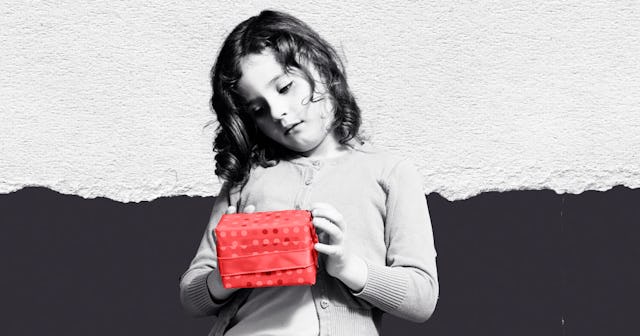Withholding Gifts As Punishment? Don’t Ever Do This

Kids are annoying. I think we’ve got that pretty much figured out.
And a good majority of the time they aren’t intentionally annoying. They just don’t have the proper brain development to behave in the ways which we would like them to. From infancy to adolescence, our children are learning the causse and effects of their actions and behavior. And if we’re being completely honest, most adults these days don’t behave in the ways I would like them to.
But in my short seven years of being a mom, you know what I have come to realize DOES NOT WORK with kids? Withholding gifts as a form of punishment. If anything, it just makes you look like a bigger ass than them. Hear me out on this one.
I get it, I was once that parent. Maybe sometimes I still am that parent. Because I’m not going to lie, Santa threats come in hot once December rolls around. But does withholding gifts as punishment ever REALLY work? Do your kids even believe you when you say you’re going to take their things away? What message are we sending to our kids? Let’s break it down!
A gift or a present is an item given to someone without the expectation of payment or anything in return.
So literally…. by definition, when you gift something to someone (no matter their age) there is no expectation of something in return. Say it with me parents — this includes good behavior!
Let me paint a picture for you. I had my first serious boyfriend at 16. It was a horrible relationship; he was a narcissist and he would frequently use his “gifts” to manipulate me into doing things he wanted me to do. Whenever he was angry or upset with me he would ask for “his” stuff back. There were multiple occasions that he pawned the things he bought for me or gave them to someone else. Sometimes he’d just give them back when he was in a good mood. Eventually it just became a cycle. If I wasn’t “behaving” he’d take them away, and when he wasn’t upset he’d give things back. 15 years later I still have trouble accepting gifts from people because of the way he used them as a form of manipulation.
Zolga_F/Getty
Are we understanding now how unhealthy this is?
I think we all can agree that those are clear indications of a toxic relationship. So why would we model a parent/child relationship in the same fashion?
Gifts are supposed to be given as an act of kindness without expectation. Do our children only deserve our kindness when they “behave?”
Do we want to go down the slippery slope of what “good behavior” is anyway? Because there is a thin line. The majority of the things kids do are not because they are trying to intentionally get on our damn nerves, they’re learning. Most child behavior is developmental. And kids pick up on EVERYTHING. Our job as their parents are to instill the correct lessons in them, and I for one don’t want to be the mom raising assholes like my ex boyfriend. There are better ways, people, better ways!
So what do we as parents do in lieu of threatening to cancel birthdays/holidays?
Provide your children with clear and consistent rules they can follow.
Remember to explain the rules to them in age appropriate terms that they are able to understand.
Allow your children to experience natural consequences.
If you break your toys, you don’t have any to play with. If you lie, you lose your parents’ trust. Natural consequence are effective in helping them see the results of their own actions. As long as the behavior isn’t harmful, this can be a good way for them to learn by themselves.
Encourage your child to tell you how they feel.
I grew up in the age of “children are to be seen, not heard”. That honestly boggles my brain to this day. Kids act out as a form of expression. Simply talking to your children and allowing them to openly express how they feel without fear of backlash goes a LONG way.
We’re all figuring this parenting thing out. We all want to raise healthy, loving and positive contributors to society. Let’s model the love and kindness we hope that they one day give to someone else.
This article was originally published on